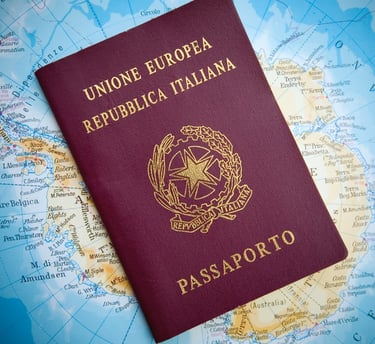Discover your boundless life
The Impact of Italy's New Minor Law on Citizenship by Descent – What You Need to Know
11/1/20242 min read


Title: The Impact of Italy's New Minor Law on Citizenship by Descent – What You Need to Know
If you have Italian ancestry, gaining Italian citizenship by descent, also known as jure sanguinis (right of blood), has long been a meaningful way to connect with your roots, explore Italian culture, and access the benefits of EU residency. However, recent legislative changes have introduced new requirements that could affect eligibility, particularly for descendants with minor ancestors at the time of immigration. Here’s what you need to know about this change and how it might impact your path to Italian citizenship.
What’s New? Italy’s Updated Minor Law
Italy’s new law introduces stricter eligibility criteria, especially for cases where Italian ancestors were minors at the time their parents were naturalized as citizens in another country. Previously, as long as you could trace your Italian lineage back to an ancestor who did not formally renounce their Italian citizenship, you could qualify for citizenship by descent. Now, if your Italian ancestor’s parents became naturalized citizens while the ancestor was still a minor, your eligibility may be affected.
This legal shift is based on the assumption that a minor ancestor automatically took on the citizenship of their parents. Unfortunately, this interpretation invalidates many claims to Italian citizenship by descent, especially for descendants of those who migrated as children and whose parents obtained new citizenships during their minority.
1948 Cases: An Important Exception
While the new minor law does limit eligibility, there is an important exception known as the "1948 cases." Italian citizenship laws were historically patrilineal, which meant citizenship could only be passed down through the male line until 1948. However, a landmark court ruling opened the door for descendants of Italian women who gave birth before 1948 to claim citizenship. In these cases, it is often possible to pursue Italian citizenship by appealing in court, as the 1948 ruling allows citizenship to be passed through maternal lineage where it was previously disallowed.
If you have an Italian ancestor who was a minor or a female ancestor born before 1948, it’s crucial to consult a specialist who can determine your eligibility under these nuanced rules. Many people in 1948 cases may still be eligible through the courts, so speaking with an Italian citizenship expert can help clarify whether you have a viable path forward.
What Steps Can You Take?
1. Connect with a Specialist: Italian citizenship laws are complex, and a specialist in Italian immigration law can help you navigate the specifics, especially if your case involves 1948 exceptions or other unique circumstances.
2. Consider a Legal Appeal: In 1948 cases, and sometimes in cases involving minors, appeals or requests for exemptions may still be possible, allowing some descendants to establish citizenship through a judicial process.
3. Alternative Residency Options: If citizenship isn’t an option, consider exploring Italy’s long-term residency or visa programs, which allow individuals with Italian heritage to experience life in Italy while still honoring their ancestral ties.
Embracing Italian Heritage
While the new minor law may limit eligibility for Italian citizenship by descent, Italy’s deep cultural heritage and vibrant communities remain open to those with Italian ancestry. For many, Italian heritage goes beyond legal status—it’s a part of their identity and legacy that continues to thrive through family traditions, cultural connections, and a lifelong appreciation of Italy’s beauty and values.
Though citizenship may not be achievable for all, staying informed, connecting with legal experts, and understanding the evolving laws can still pave the way for meaningful connections with your Italian heritage. Italy’s legacy lives on through those who carry its stories, values, and spirit, no matter where life takes them.